Business Research: Literature Review on Accounting Innovation Trends
VerifiedAdded on 2023/02/01
|9
|2197
|30
Literature Review
AI Summary
This literature review examines the impact of technological innovation on the field of accounting. It analyzes four articles that explore the advantages and disadvantages of accounting innovation, the shift in the role of accountants, and the implications for businesses. The review highlights the influence of cloud computing, ERP systems, and forensic accounting. It also addresses the limitations of the studies and provides insights into future research directions, focusing on areas such as the role of innovation and practices within the field of auditing and its impact on business models. The review emphasizes the importance of adapting to technological advancements to stay competitive and sustainable in the field of accountancy.
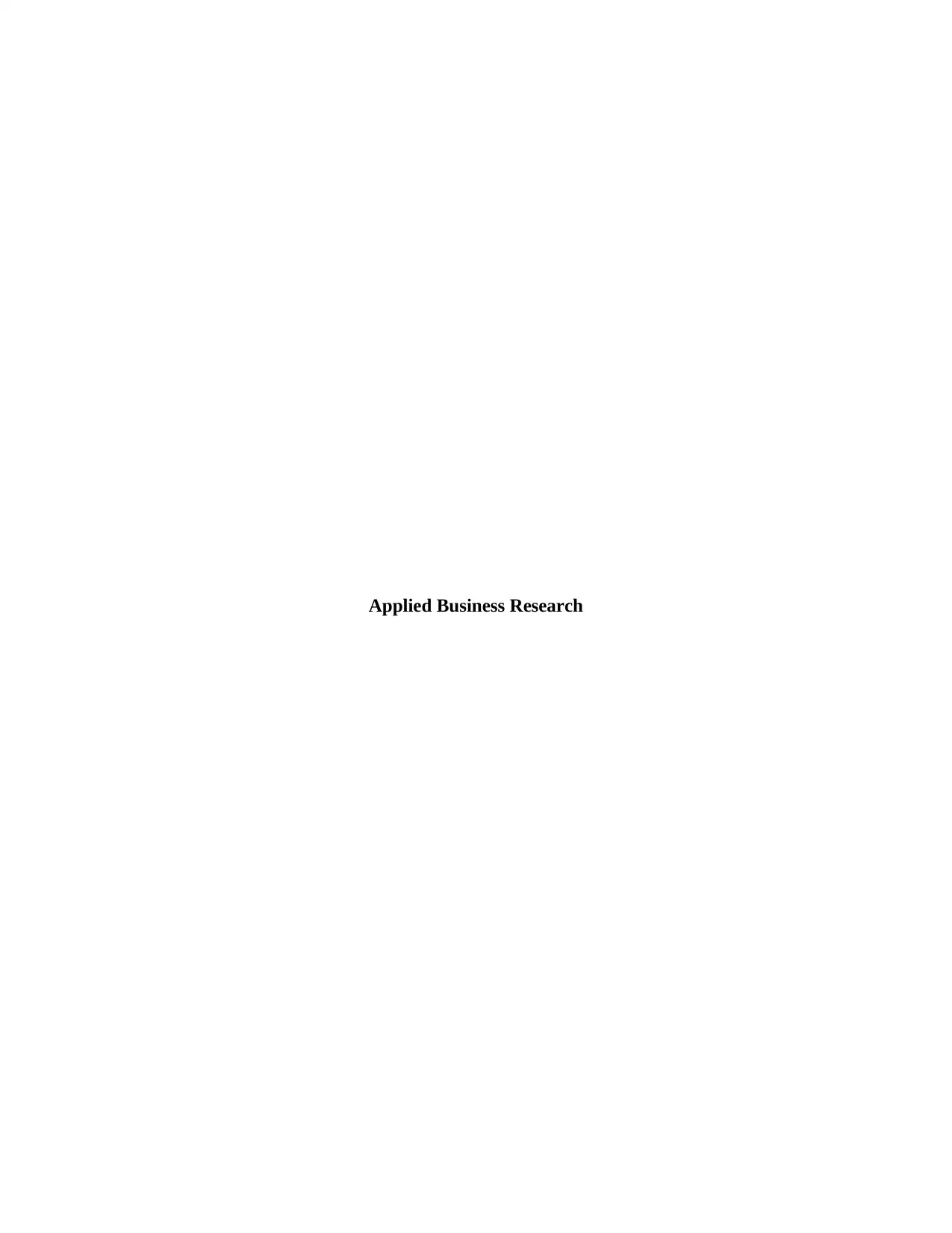
Applied Business Research
Paraphrase This Document
Need a fresh take? Get an instant paraphrase of this document with our AI Paraphraser
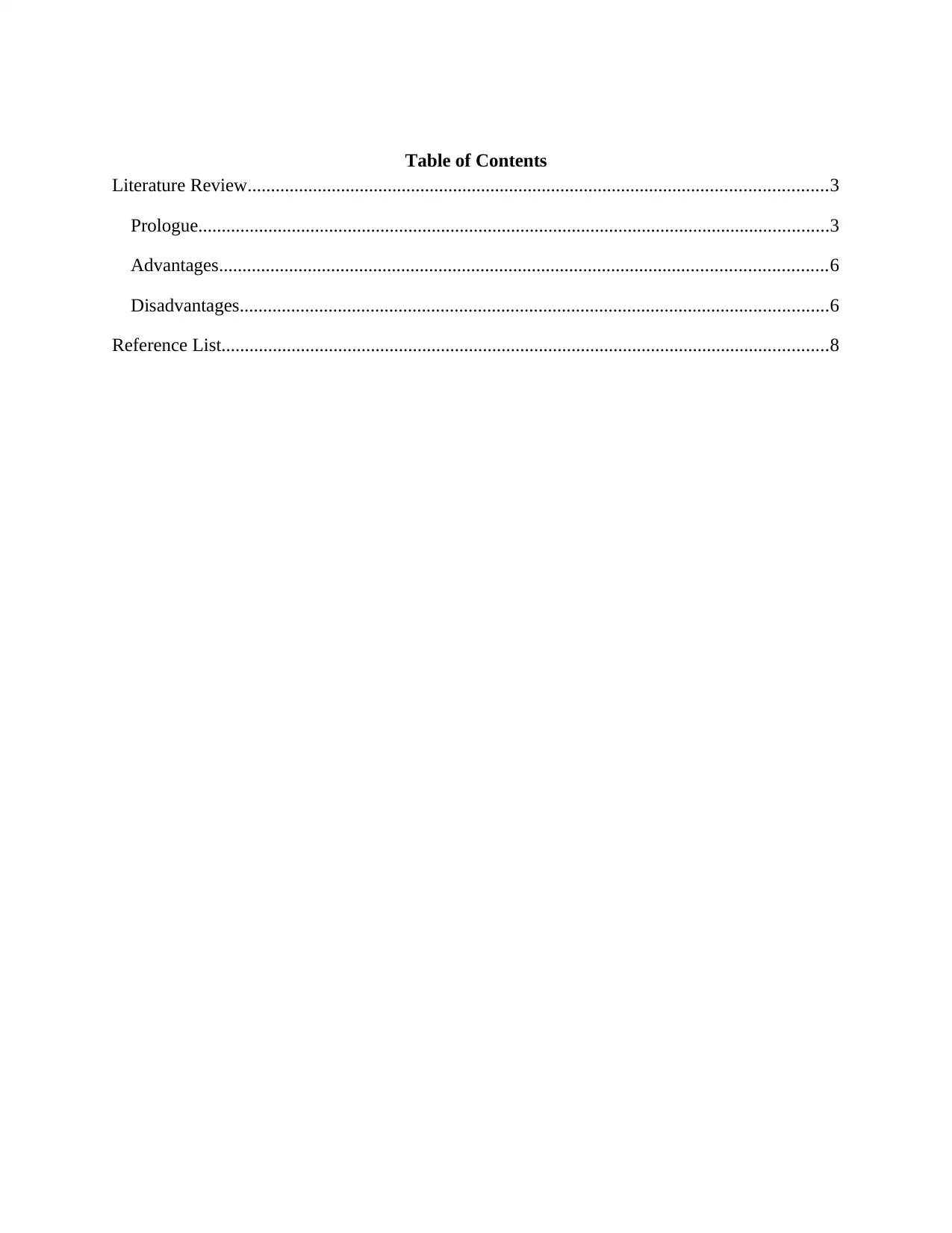
Table of Contents
Literature Review............................................................................................................................3
Prologue.......................................................................................................................................3
Advantages..................................................................................................................................6
Disadvantages..............................................................................................................................6
Reference List..................................................................................................................................8
Literature Review............................................................................................................................3
Prologue.......................................................................................................................................3
Advantages..................................................................................................................................6
Disadvantages..............................................................................................................................6
Reference List..................................................................................................................................8
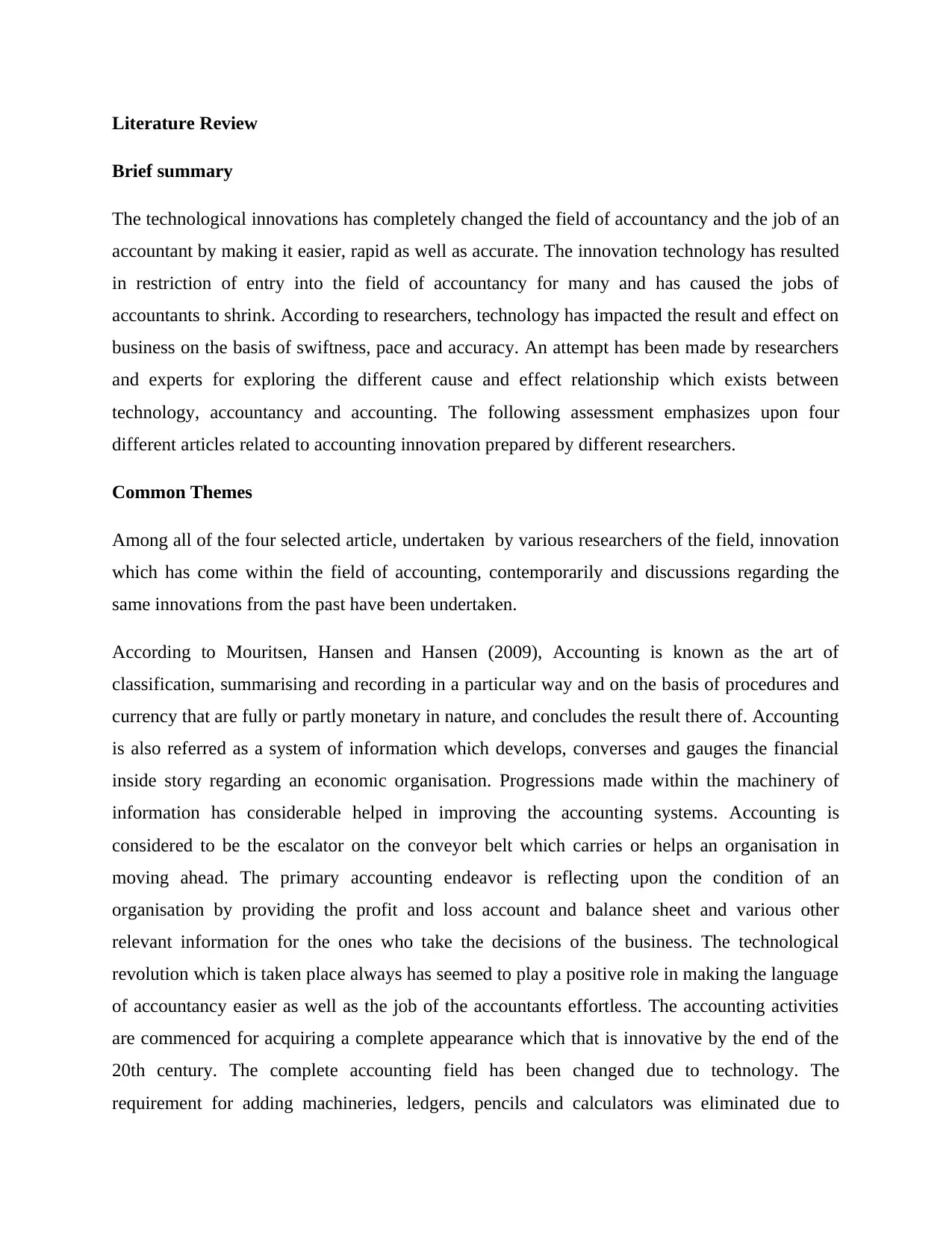
Literature Review
Brief summary
The technological innovations has completely changed the field of accountancy and the job of an
accountant by making it easier, rapid as well as accurate. The innovation technology has resulted
in restriction of entry into the field of accountancy for many and has caused the jobs of
accountants to shrink. According to researchers, technology has impacted the result and effect on
business on the basis of swiftness, pace and accuracy. An attempt has been made by researchers
and experts for exploring the different cause and effect relationship which exists between
technology, accountancy and accounting. The following assessment emphasizes upon four
different articles related to accounting innovation prepared by different researchers.
Common Themes
Among all of the four selected article, undertaken by various researchers of the field, innovation
which has come within the field of accounting, contemporarily and discussions regarding the
same innovations from the past have been undertaken.
According to Mouritsen, Hansen and Hansen (2009), Accounting is known as the art of
classification, summarising and recording in a particular way and on the basis of procedures and
currency that are fully or partly monetary in nature, and concludes the result there of. Accounting
is also referred as a system of information which develops, converses and gauges the financial
inside story regarding an economic organisation. Progressions made within the machinery of
information has considerable helped in improving the accounting systems. Accounting is
considered to be the escalator on the conveyor belt which carries or helps an organisation in
moving ahead. The primary accounting endeavor is reflecting upon the condition of an
organisation by providing the profit and loss account and balance sheet and various other
relevant information for the ones who take the decisions of the business. The technological
revolution which is taken place always has seemed to play a positive role in making the language
of accountancy easier as well as the job of the accountants effortless. The accounting activities
are commenced for acquiring a complete appearance which that is innovative by the end of the
20th century. The complete accounting field has been changed due to technology. The
requirement for adding machineries, ledgers, pencils and calculators was eliminated due to
Brief summary
The technological innovations has completely changed the field of accountancy and the job of an
accountant by making it easier, rapid as well as accurate. The innovation technology has resulted
in restriction of entry into the field of accountancy for many and has caused the jobs of
accountants to shrink. According to researchers, technology has impacted the result and effect on
business on the basis of swiftness, pace and accuracy. An attempt has been made by researchers
and experts for exploring the different cause and effect relationship which exists between
technology, accountancy and accounting. The following assessment emphasizes upon four
different articles related to accounting innovation prepared by different researchers.
Common Themes
Among all of the four selected article, undertaken by various researchers of the field, innovation
which has come within the field of accounting, contemporarily and discussions regarding the
same innovations from the past have been undertaken.
According to Mouritsen, Hansen and Hansen (2009), Accounting is known as the art of
classification, summarising and recording in a particular way and on the basis of procedures and
currency that are fully or partly monetary in nature, and concludes the result there of. Accounting
is also referred as a system of information which develops, converses and gauges the financial
inside story regarding an economic organisation. Progressions made within the machinery of
information has considerable helped in improving the accounting systems. Accounting is
considered to be the escalator on the conveyor belt which carries or helps an organisation in
moving ahead. The primary accounting endeavor is reflecting upon the condition of an
organisation by providing the profit and loss account and balance sheet and various other
relevant information for the ones who take the decisions of the business. The technological
revolution which is taken place always has seemed to play a positive role in making the language
of accountancy easier as well as the job of the accountants effortless. The accounting activities
are commenced for acquiring a complete appearance which that is innovative by the end of the
20th century. The complete accounting field has been changed due to technology. The
requirement for adding machineries, ledgers, pencils and calculators was eliminated due to
⊘ This is a preview!⊘
Do you want full access?
Subscribe today to unlock all pages.

Trusted by 1+ million students worldwide
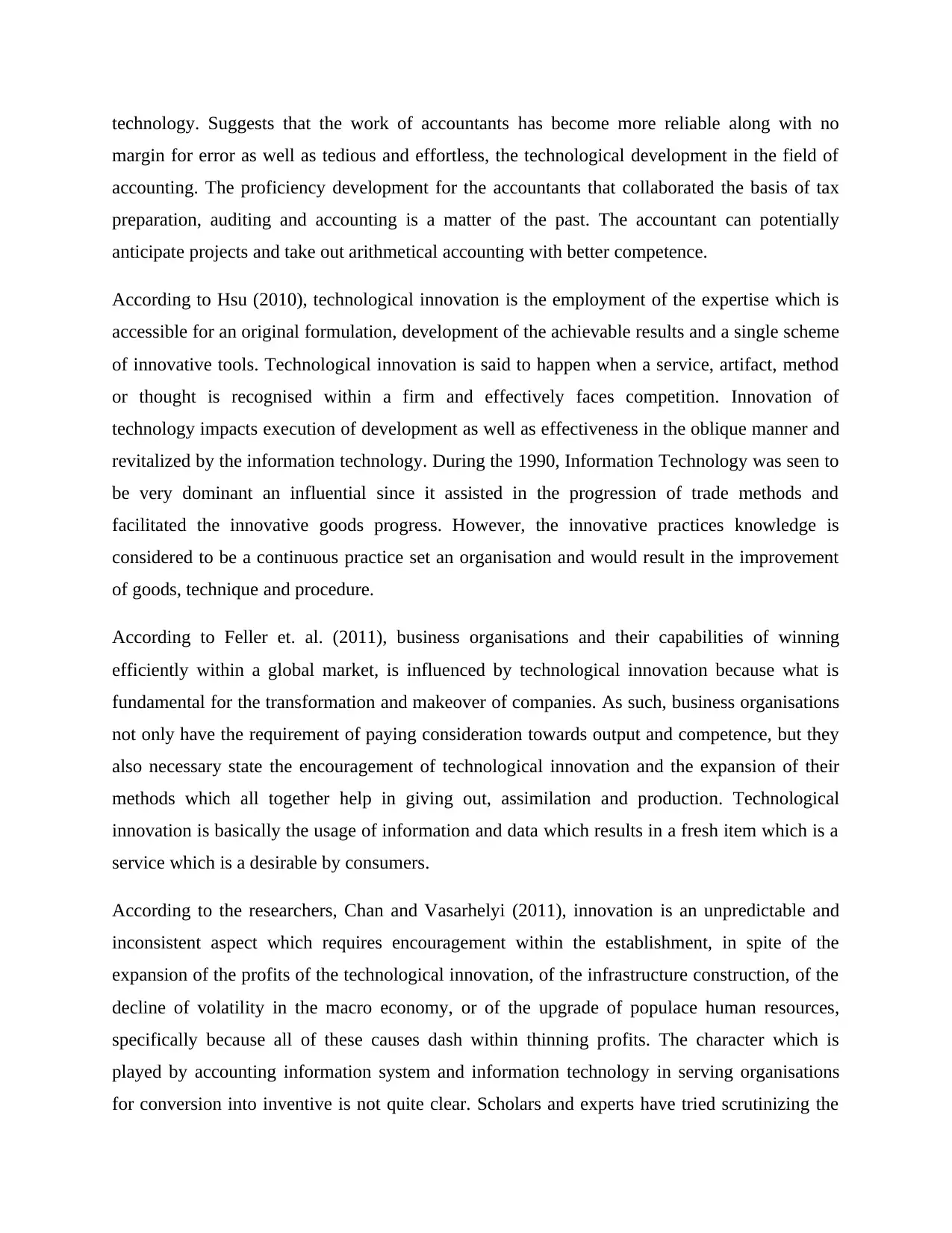
technology. Suggests that the work of accountants has become more reliable along with no
margin for error as well as tedious and effortless, the technological development in the field of
accounting. The proficiency development for the accountants that collaborated the basis of tax
preparation, auditing and accounting is a matter of the past. The accountant can potentially
anticipate projects and take out arithmetical accounting with better competence.
According to Hsu (2010), technological innovation is the employment of the expertise which is
accessible for an original formulation, development of the achievable results and a single scheme
of innovative tools. Technological innovation is said to happen when a service, artifact, method
or thought is recognised within a firm and effectively faces competition. Innovation of
technology impacts execution of development as well as effectiveness in the oblique manner and
revitalized by the information technology. During the 1990, Information Technology was seen to
be very dominant an influential since it assisted in the progression of trade methods and
facilitated the innovative goods progress. However, the innovative practices knowledge is
considered to be a continuous practice set an organisation and would result in the improvement
of goods, technique and procedure.
According to Feller et. al. (2011), business organisations and their capabilities of winning
efficiently within a global market, is influenced by technological innovation because what is
fundamental for the transformation and makeover of companies. As such, business organisations
not only have the requirement of paying consideration towards output and competence, but they
also necessary state the encouragement of technological innovation and the expansion of their
methods which all together help in giving out, assimilation and production. Technological
innovation is basically the usage of information and data which results in a fresh item which is a
service which is a desirable by consumers.
According to the researchers, Chan and Vasarhelyi (2011), innovation is an unpredictable and
inconsistent aspect which requires encouragement within the establishment, in spite of the
expansion of the profits of the technological innovation, of the infrastructure construction, of the
decline of volatility in the macro economy, or of the upgrade of populace human resources,
specifically because all of these causes dash within thinning profits. The character which is
played by accounting information system and information technology in serving organisations
for conversion into inventive is not quite clear. Scholars and experts have tried scrutinizing the
margin for error as well as tedious and effortless, the technological development in the field of
accounting. The proficiency development for the accountants that collaborated the basis of tax
preparation, auditing and accounting is a matter of the past. The accountant can potentially
anticipate projects and take out arithmetical accounting with better competence.
According to Hsu (2010), technological innovation is the employment of the expertise which is
accessible for an original formulation, development of the achievable results and a single scheme
of innovative tools. Technological innovation is said to happen when a service, artifact, method
or thought is recognised within a firm and effectively faces competition. Innovation of
technology impacts execution of development as well as effectiveness in the oblique manner and
revitalized by the information technology. During the 1990, Information Technology was seen to
be very dominant an influential since it assisted in the progression of trade methods and
facilitated the innovative goods progress. However, the innovative practices knowledge is
considered to be a continuous practice set an organisation and would result in the improvement
of goods, technique and procedure.
According to Feller et. al. (2011), business organisations and their capabilities of winning
efficiently within a global market, is influenced by technological innovation because what is
fundamental for the transformation and makeover of companies. As such, business organisations
not only have the requirement of paying consideration towards output and competence, but they
also necessary state the encouragement of technological innovation and the expansion of their
methods which all together help in giving out, assimilation and production. Technological
innovation is basically the usage of information and data which results in a fresh item which is a
service which is a desirable by consumers.
According to the researchers, Chan and Vasarhelyi (2011), innovation is an unpredictable and
inconsistent aspect which requires encouragement within the establishment, in spite of the
expansion of the profits of the technological innovation, of the infrastructure construction, of the
decline of volatility in the macro economy, or of the upgrade of populace human resources,
specifically because all of these causes dash within thinning profits. The character which is
played by accounting information system and information technology in serving organisations
for conversion into inventive is not quite clear. Scholars and experts have tried scrutinizing the
Paraphrase This Document
Need a fresh take? Get an instant paraphrase of this document with our AI Paraphraser
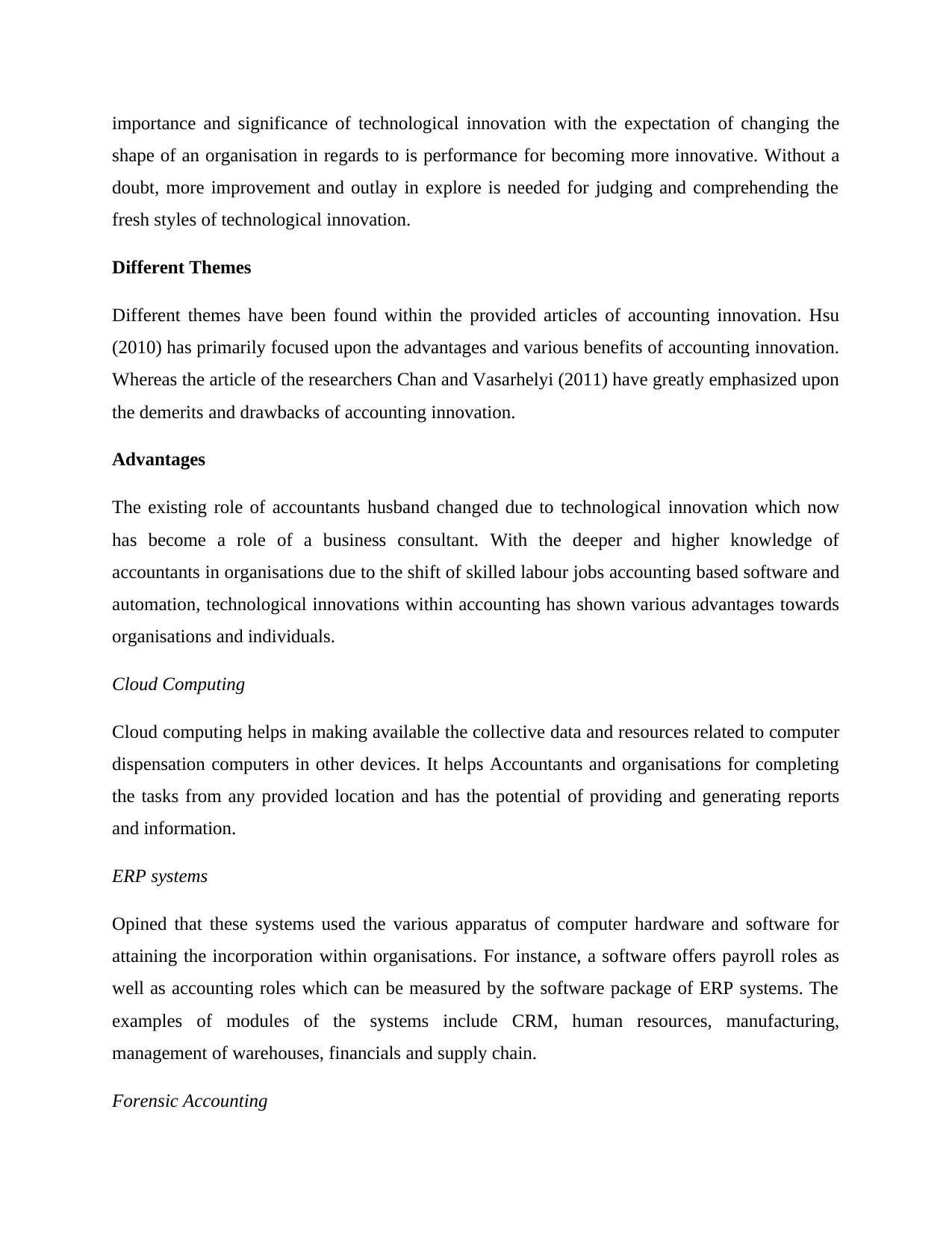
importance and significance of technological innovation with the expectation of changing the
shape of an organisation in regards to is performance for becoming more innovative. Without a
doubt, more improvement and outlay in explore is needed for judging and comprehending the
fresh styles of technological innovation.
Different Themes
Different themes have been found within the provided articles of accounting innovation. Hsu
(2010) has primarily focused upon the advantages and various benefits of accounting innovation.
Whereas the article of the researchers Chan and Vasarhelyi (2011) have greatly emphasized upon
the demerits and drawbacks of accounting innovation.
Advantages
The existing role of accountants husband changed due to technological innovation which now
has become a role of a business consultant. With the deeper and higher knowledge of
accountants in organisations due to the shift of skilled labour jobs accounting based software and
automation, technological innovations within accounting has shown various advantages towards
organisations and individuals.
Cloud Computing
Cloud computing helps in making available the collective data and resources related to computer
dispensation computers in other devices. It helps Accountants and organisations for completing
the tasks from any provided location and has the potential of providing and generating reports
and information.
ERP systems
Opined that these systems used the various apparatus of computer hardware and software for
attaining the incorporation within organisations. For instance, a software offers payroll roles as
well as accounting roles which can be measured by the software package of ERP systems. The
examples of modules of the systems include CRM, human resources, manufacturing,
management of warehouses, financials and supply chain.
Forensic Accounting
shape of an organisation in regards to is performance for becoming more innovative. Without a
doubt, more improvement and outlay in explore is needed for judging and comprehending the
fresh styles of technological innovation.
Different Themes
Different themes have been found within the provided articles of accounting innovation. Hsu
(2010) has primarily focused upon the advantages and various benefits of accounting innovation.
Whereas the article of the researchers Chan and Vasarhelyi (2011) have greatly emphasized upon
the demerits and drawbacks of accounting innovation.
Advantages
The existing role of accountants husband changed due to technological innovation which now
has become a role of a business consultant. With the deeper and higher knowledge of
accountants in organisations due to the shift of skilled labour jobs accounting based software and
automation, technological innovations within accounting has shown various advantages towards
organisations and individuals.
Cloud Computing
Cloud computing helps in making available the collective data and resources related to computer
dispensation computers in other devices. It helps Accountants and organisations for completing
the tasks from any provided location and has the potential of providing and generating reports
and information.
ERP systems
Opined that these systems used the various apparatus of computer hardware and software for
attaining the incorporation within organisations. For instance, a software offers payroll roles as
well as accounting roles which can be measured by the software package of ERP systems. The
examples of modules of the systems include CRM, human resources, manufacturing,
management of warehouses, financials and supply chain.
Forensic Accounting
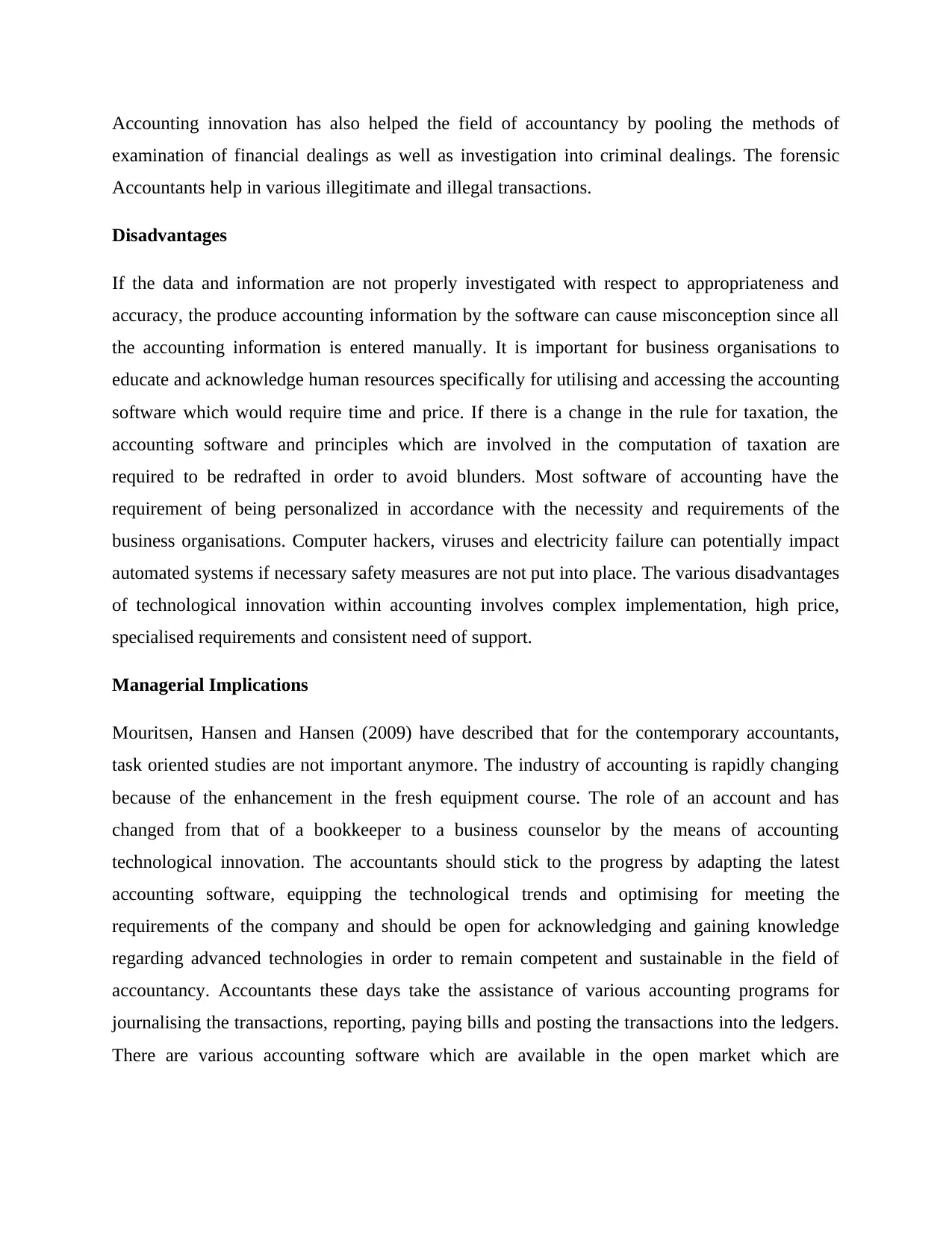
Accounting innovation has also helped the field of accountancy by pooling the methods of
examination of financial dealings as well as investigation into criminal dealings. The forensic
Accountants help in various illegitimate and illegal transactions.
Disadvantages
If the data and information are not properly investigated with respect to appropriateness and
accuracy, the produce accounting information by the software can cause misconception since all
the accounting information is entered manually. It is important for business organisations to
educate and acknowledge human resources specifically for utilising and accessing the accounting
software which would require time and price. If there is a change in the rule for taxation, the
accounting software and principles which are involved in the computation of taxation are
required to be redrafted in order to avoid blunders. Most software of accounting have the
requirement of being personalized in accordance with the necessity and requirements of the
business organisations. Computer hackers, viruses and electricity failure can potentially impact
automated systems if necessary safety measures are not put into place. The various disadvantages
of technological innovation within accounting involves complex implementation, high price,
specialised requirements and consistent need of support.
Managerial Implications
Mouritsen, Hansen and Hansen (2009) have described that for the contemporary accountants,
task oriented studies are not important anymore. The industry of accounting is rapidly changing
because of the enhancement in the fresh equipment course. The role of an account and has
changed from that of a bookkeeper to a business counselor by the means of accounting
technological innovation. The accountants should stick to the progress by adapting the latest
accounting software, equipping the technological trends and optimising for meeting the
requirements of the company and should be open for acknowledging and gaining knowledge
regarding advanced technologies in order to remain competent and sustainable in the field of
accountancy. Accountants these days take the assistance of various accounting programs for
journalising the transactions, reporting, paying bills and posting the transactions into the ledgers.
There are various accounting software which are available in the open market which are
examination of financial dealings as well as investigation into criminal dealings. The forensic
Accountants help in various illegitimate and illegal transactions.
Disadvantages
If the data and information are not properly investigated with respect to appropriateness and
accuracy, the produce accounting information by the software can cause misconception since all
the accounting information is entered manually. It is important for business organisations to
educate and acknowledge human resources specifically for utilising and accessing the accounting
software which would require time and price. If there is a change in the rule for taxation, the
accounting software and principles which are involved in the computation of taxation are
required to be redrafted in order to avoid blunders. Most software of accounting have the
requirement of being personalized in accordance with the necessity and requirements of the
business organisations. Computer hackers, viruses and electricity failure can potentially impact
automated systems if necessary safety measures are not put into place. The various disadvantages
of technological innovation within accounting involves complex implementation, high price,
specialised requirements and consistent need of support.
Managerial Implications
Mouritsen, Hansen and Hansen (2009) have described that for the contemporary accountants,
task oriented studies are not important anymore. The industry of accounting is rapidly changing
because of the enhancement in the fresh equipment course. The role of an account and has
changed from that of a bookkeeper to a business counselor by the means of accounting
technological innovation. The accountants should stick to the progress by adapting the latest
accounting software, equipping the technological trends and optimising for meeting the
requirements of the company and should be open for acknowledging and gaining knowledge
regarding advanced technologies in order to remain competent and sustainable in the field of
accountancy. Accountants these days take the assistance of various accounting programs for
journalising the transactions, reporting, paying bills and posting the transactions into the ledgers.
There are various accounting software which are available in the open market which are
⊘ This is a preview!⊘
Do you want full access?
Subscribe today to unlock all pages.

Trusted by 1+ million students worldwide
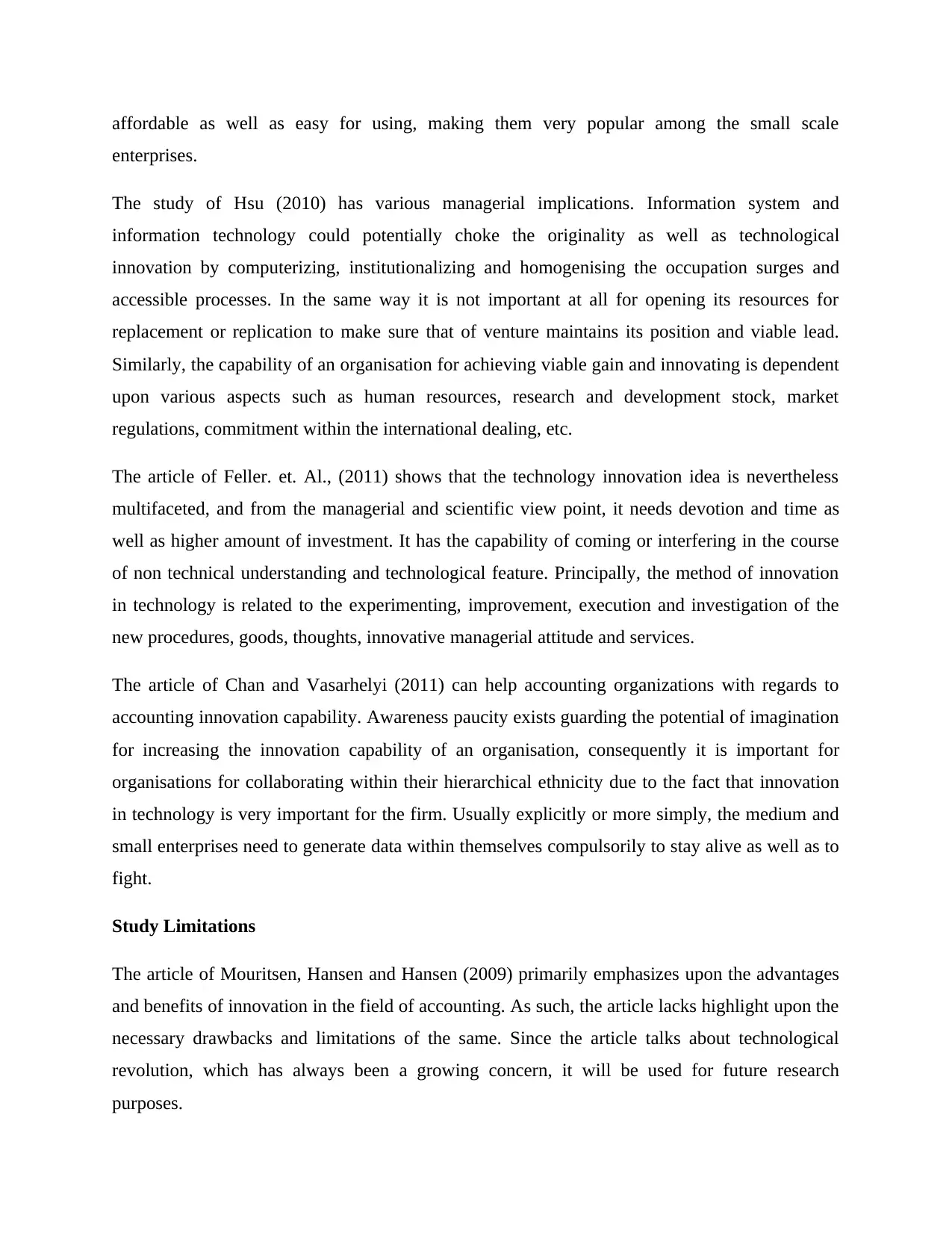
affordable as well as easy for using, making them very popular among the small scale
enterprises.
The study of Hsu (2010) has various managerial implications. Information system and
information technology could potentially choke the originality as well as technological
innovation by computerizing, institutionalizing and homogenising the occupation surges and
accessible processes. In the same way it is not important at all for opening its resources for
replacement or replication to make sure that of venture maintains its position and viable lead.
Similarly, the capability of an organisation for achieving viable gain and innovating is dependent
upon various aspects such as human resources, research and development stock, market
regulations, commitment within the international dealing, etc.
The article of Feller. et. Al., (2011) shows that the technology innovation idea is nevertheless
multifaceted, and from the managerial and scientific view point, it needs devotion and time as
well as higher amount of investment. It has the capability of coming or interfering in the course
of non technical understanding and technological feature. Principally, the method of innovation
in technology is related to the experimenting, improvement, execution and investigation of the
new procedures, goods, thoughts, innovative managerial attitude and services.
The article of Chan and Vasarhelyi (2011) can help accounting organizations with regards to
accounting innovation capability. Awareness paucity exists guarding the potential of imagination
for increasing the innovation capability of an organisation, consequently it is important for
organisations for collaborating within their hierarchical ethnicity due to the fact that innovation
in technology is very important for the firm. Usually explicitly or more simply, the medium and
small enterprises need to generate data within themselves compulsorily to stay alive as well as to
fight.
Study Limitations
The article of Mouritsen, Hansen and Hansen (2009) primarily emphasizes upon the advantages
and benefits of innovation in the field of accounting. As such, the article lacks highlight upon the
necessary drawbacks and limitations of the same. Since the article talks about technological
revolution, which has always been a growing concern, it will be used for future research
purposes.
enterprises.
The study of Hsu (2010) has various managerial implications. Information system and
information technology could potentially choke the originality as well as technological
innovation by computerizing, institutionalizing and homogenising the occupation surges and
accessible processes. In the same way it is not important at all for opening its resources for
replacement or replication to make sure that of venture maintains its position and viable lead.
Similarly, the capability of an organisation for achieving viable gain and innovating is dependent
upon various aspects such as human resources, research and development stock, market
regulations, commitment within the international dealing, etc.
The article of Feller. et. Al., (2011) shows that the technology innovation idea is nevertheless
multifaceted, and from the managerial and scientific view point, it needs devotion and time as
well as higher amount of investment. It has the capability of coming or interfering in the course
of non technical understanding and technological feature. Principally, the method of innovation
in technology is related to the experimenting, improvement, execution and investigation of the
new procedures, goods, thoughts, innovative managerial attitude and services.
The article of Chan and Vasarhelyi (2011) can help accounting organizations with regards to
accounting innovation capability. Awareness paucity exists guarding the potential of imagination
for increasing the innovation capability of an organisation, consequently it is important for
organisations for collaborating within their hierarchical ethnicity due to the fact that innovation
in technology is very important for the firm. Usually explicitly or more simply, the medium and
small enterprises need to generate data within themselves compulsorily to stay alive as well as to
fight.
Study Limitations
The article of Mouritsen, Hansen and Hansen (2009) primarily emphasizes upon the advantages
and benefits of innovation in the field of accounting. As such, the article lacks highlight upon the
necessary drawbacks and limitations of the same. Since the article talks about technological
revolution, which has always been a growing concern, it will be used for future research
purposes.
Paraphrase This Document
Need a fresh take? Get an instant paraphrase of this document with our AI Paraphraser
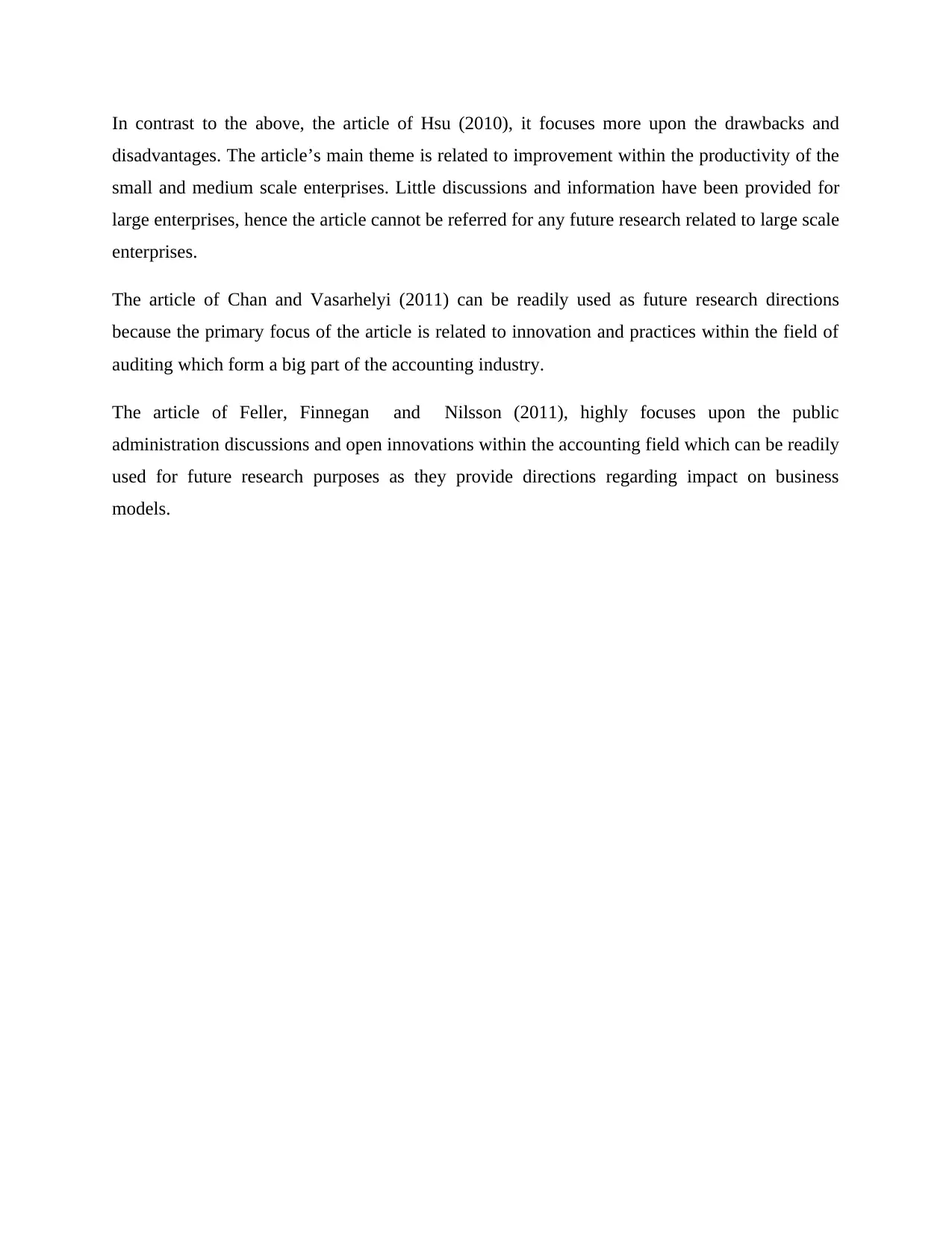
In contrast to the above, the article of Hsu (2010), it focuses more upon the drawbacks and
disadvantages. The article’s main theme is related to improvement within the productivity of the
small and medium scale enterprises. Little discussions and information have been provided for
large enterprises, hence the article cannot be referred for any future research related to large scale
enterprises.
The article of Chan and Vasarhelyi (2011) can be readily used as future research directions
because the primary focus of the article is related to innovation and practices within the field of
auditing which form a big part of the accounting industry.
The article of Feller, Finnegan and Nilsson (2011), highly focuses upon the public
administration discussions and open innovations within the accounting field which can be readily
used for future research purposes as they provide directions regarding impact on business
models.
disadvantages. The article’s main theme is related to improvement within the productivity of the
small and medium scale enterprises. Little discussions and information have been provided for
large enterprises, hence the article cannot be referred for any future research related to large scale
enterprises.
The article of Chan and Vasarhelyi (2011) can be readily used as future research directions
because the primary focus of the article is related to innovation and practices within the field of
auditing which form a big part of the accounting industry.
The article of Feller, Finnegan and Nilsson (2011), highly focuses upon the public
administration discussions and open innovations within the accounting field which can be readily
used for future research purposes as they provide directions regarding impact on business
models.
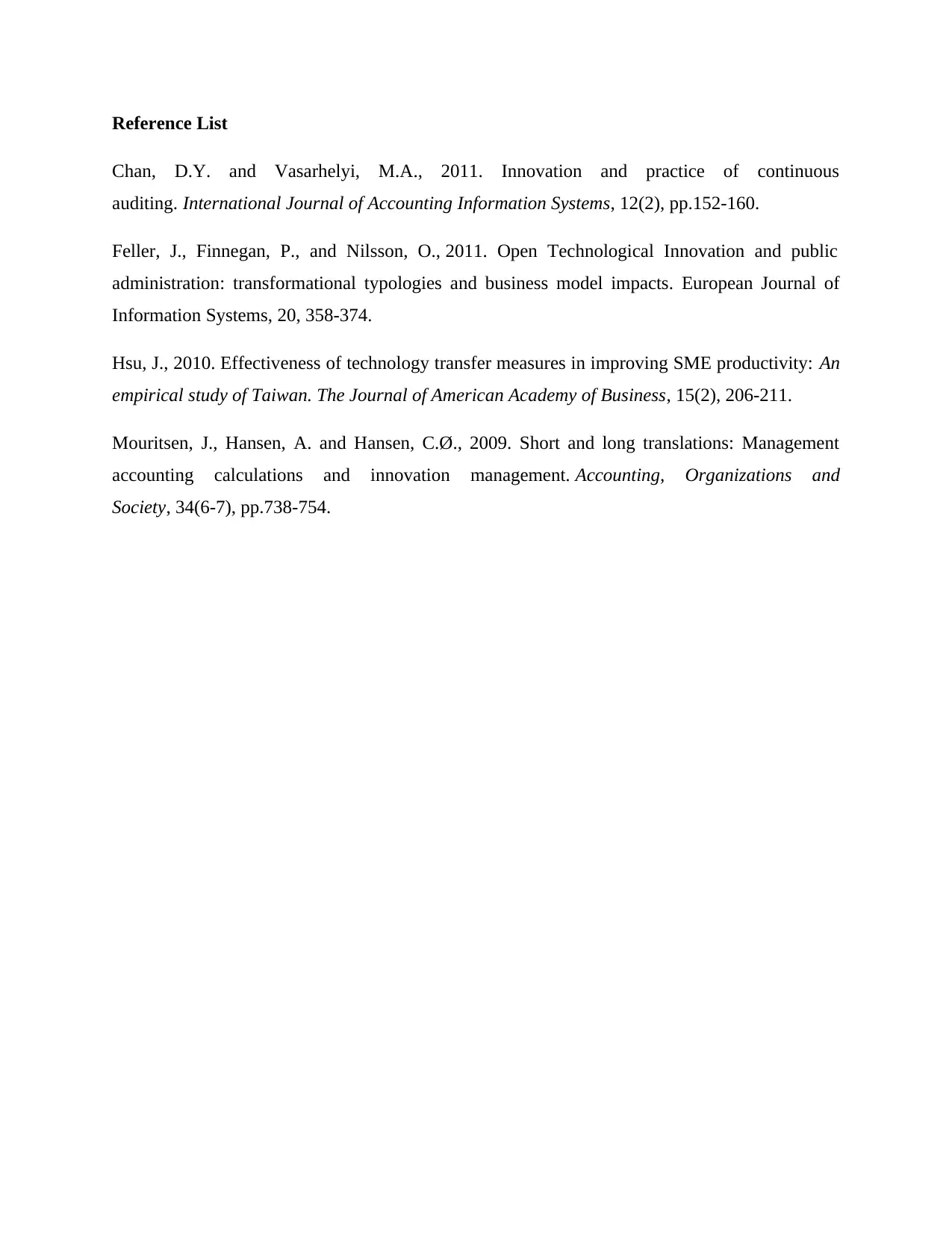
Reference List
Chan, D.Y. and Vasarhelyi, M.A., 2011. Innovation and practice of continuous
auditing. International Journal of Accounting Information Systems, 12(2), pp.152-160.
Feller, J., Finnegan, P., and Nilsson, O., 2011. Open Technological Innovation and public
administration: transformational typologies and business model impacts. European Journal of
Information Systems, 20, 358-374.
Hsu, J., 2010. Effectiveness of technology transfer measures in improving SME productivity: An
empirical study of Taiwan. The Journal of American Academy of Business, 15(2), 206-211.
Mouritsen, J., Hansen, A. and Hansen, C.Ø., 2009. Short and long translations: Management
accounting calculations and innovation management. Accounting, Organizations and
Society, 34(6-7), pp.738-754.
Chan, D.Y. and Vasarhelyi, M.A., 2011. Innovation and practice of continuous
auditing. International Journal of Accounting Information Systems, 12(2), pp.152-160.
Feller, J., Finnegan, P., and Nilsson, O., 2011. Open Technological Innovation and public
administration: transformational typologies and business model impacts. European Journal of
Information Systems, 20, 358-374.
Hsu, J., 2010. Effectiveness of technology transfer measures in improving SME productivity: An
empirical study of Taiwan. The Journal of American Academy of Business, 15(2), 206-211.
Mouritsen, J., Hansen, A. and Hansen, C.Ø., 2009. Short and long translations: Management
accounting calculations and innovation management. Accounting, Organizations and
Society, 34(6-7), pp.738-754.
⊘ This is a preview!⊘
Do you want full access?
Subscribe today to unlock all pages.

Trusted by 1+ million students worldwide
1 out of 9
Related Documents
Your All-in-One AI-Powered Toolkit for Academic Success.
+13062052269
info@desklib.com
Available 24*7 on WhatsApp / Email
![[object Object]](/_next/static/media/star-bottom.7253800d.svg)
Unlock your academic potential
Copyright © 2020–2026 A2Z Services. All Rights Reserved. Developed and managed by ZUCOL.





